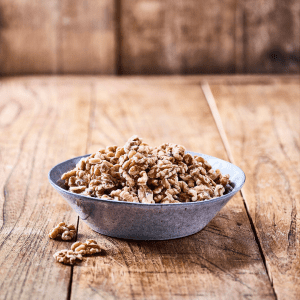Five Things You Didn’t Know Could Affect Male Fertility
According to the NHS, around 1 in 7 couples may have difficulty conceiving[1]. In many cases, the focus on treating infertility can be on women, but, as half of (heterosexual) couples are men, it pays to remember that successful conception requires both healthy eggs and sperm and a man’s reproductive health will have a big impact on how likely a couple is to conceive.
Research[2] reveals that sperm count among Western men has dropped by 50-60% over the last 40 years and the World Health Organisation (WHO) estimates that men contribute to difficulties conceiving in 50% of cases worldwide.
The good news is that simple changes can have a big impact on male fertility. So, Melanie Brown, Nutritionist and Specialist in Fertility, IVF and Pregnancy, has shared five things you may not know can affect male fertility, for California Walnuts.
As Melanie says; “Male infertility is dramatically increasing, and many men are just not aware of how choosing negative diet and lifestyle choices may affect their own future fertility. There is so much information around about female fertility – the dangers of being overweight and leaving it until we are too old etc – but virtually nothing to educate men, who are fast overtaking women in the infertility stakes. The other problem is that men don’t talk about things like this. They bottle it up, don’t know where to turn for help and information and suffer in silence – making things so much worse. And often health professionals also compound this by telling men there is nothing they can do to improver their fertility anyway!
The good news however is that by being informed about the things that have an impact on fertility, men can do so much to help themselves! Maintaining a healthy weight, (especially around the middle), following a sensible fitness routine and enjoying a colourful Mediterranean style diet rich in sperm-protective antioxidants can all make a massive difference. And evidence shows that specific foods like walnuts, which are rich in antioxidants and healthy fats, can really impact sperm quality and motility.
By informing themselves and making the right diet and lifestyle changes, men can do so much to support their fertility!”
- A Healthy Diet Can Have A Bigger Impact Than You Might Think…
Eating a healthy, balanced diet is essential for keeping sperm in good condition and should try include at least five portions of fruit and vegetables a day, carbohydrates such as wholemeal bread and pasta and lean meat, fish and pulses for protein[3]. The more colour the better!
It is important to try and eat less saturated fat, sugar and salt[4], as eating too much of foods high in these can have a negative impact on fertility. One study found that men favouring junk food, such as high-fat and processed foods like pizzas, chips and snacks, could irreversibly damage their fertility by the time they reach the age of just 18, by killing off sperm producing cells that can never be replaced.
The good news however, is that making changes to follow a healthy diet can have a big impact. The authors of the same study found that improvements in lifestyle can begin to benefit sperm quality within two to three months[5].
- Enjoy Foods Rich In Antioxidants
As well as limiting foods high in fat, salt and sugar, it is also important to include enough foods high in antioxidants in the diet. An imbalance between antioxidants and something called reactive oxygen species (ROS), which neutralise antioxidants is considered one of the main causes of infertility in men.
This was backed up by a review[6] of 35 published studies which found that diets rich in vitamin e, vitamin c, b-carotene, selenium, zinc, cryptoxanthin and lycopene, omega-3 fatty acids, vitamin D and folate and low in saturated fat and trans-fatty acids were inversely associated with low semen quality.
- Adding Walnuts to the Diet can Improve Sperm Motility
Including walnuts as part of a healthy balanced diet can have a positive impact on male fertility. A study[7] of 117 healthy young men, aged between 21-35, who routinely ate a Western-style diet, evaluated the effect of eating 75g of walnuts per day on semen quality. Approximately half of the group consumed 75g of walnuts per day for 12 weeks, while the other half served as the control group. After 12 weeks, the group eating walnuts experienced positive shifts in sperm quality factors including vitality, motility (movement) and morphology (form) – all key components in male fertility.
Another study showed that mice fed a walnut-rich diet showed a reduction in lipid peroxidation; a process that can damage sperm cells.[8] Both studies (which are summarised in this video) provide encouraging results regarding men’s reproductive health research and show that walnuts may play a role.
As Dr. Wendie Robbins from the University of California, Los Angeles, who conducted the first trial comments; “Enjoying a healthy diet has been shown to have a positive impact on male fertility and is a simple change that men can make to improve their chances of having a baby. Evidence shows that adding walnuts to the diet can improve sperm motility, so they may benefit men looking to conceive. Outside of that, walnuts are the only tree nut to contain a significant amount of the plant-based essential omega-3, alpha-linolenic acid (ALA) (2.7g/ 30g), provide 4.4g of protein and 1.4g of fibre[9]. They are also a good source of folate and contain iron and zinc, so are a great addition to a healthy balanced diet.”
Another study on 119 healthy men, aged between 18–35, explored the impact on sperm quality of adding 60g of a mixture of nuts (30g of walnuts, 15g of almonds and 15g of hazelnuts) to the men’s diet. One group of participants was fed the usual Western-style diet enriched with the 60g of nuts and the other was fed the usual Western-style diet. Compared with the control group, the group eating walnuts saw significant improvements in total sperm count and the vitality, motility and morphology of the sperm. These findings could be partly explained by a reduction in the sperm DNA fragmentation[10].
- Obesity can have a number of ‘knock on’ effects
Obesity is a common problem estimated to affect around 1 in every 4 adults, but maintaining a healthy weight is essential for keeping sperm in good condition[11]. Being overweight may affect the quality and quantity of your sperm[12] and obesity can also lead to a number of other conditions, which may have an effect fertility, such as the development of type 2 diabetes, as well as psychological problems such as depression and low self-esteem[13]. Men who are overweight and trying to conceive should try to lose weight by combining healthy eating with regular exercise[14].
Walnuts have also been studied in relation to diabetes. A population study representing more than 34 000 American adults suggests those who consume walnuts may have about half the risk of developing type 2 diabetes, compared to adults who do not eat nuts [15].
- Follow a Sensible Fitness Routine
Enjoying exercise can have a positive effect on male fertility. In a study[16] involving 90 obese adults, half took part in three aerobic training sessions each week, for 16 weeks. At the end of the programme, these men’s sperm count, motility, and morphology had significantly increased. The NHS advises that adults should aim to be physically active every day – completing at least 150 minutes of moderate intensity activity a week or 75 minutes of vigorous intensity activity a week and taking part in strengthening activities on at least 2 days a week[17].
Although enjoying exercise is a positive for male fertility extreme cycling can have a negative impact, with one study finding that sperm quality drops dramatically with rigorous cycling training. The Spanish study of top triathletes found those who cover more than 186 miles (300km) a week on their bikes have less than 4% normal looking sperm and that at such levels, men would have ‘significant fertility problems’[18].
Taking anabolic steroids can also cause long term infertility problems, by reducing sperm count and sperm mobility[19], so if you are trying for a baby it’s a good idea not to use them at all.




